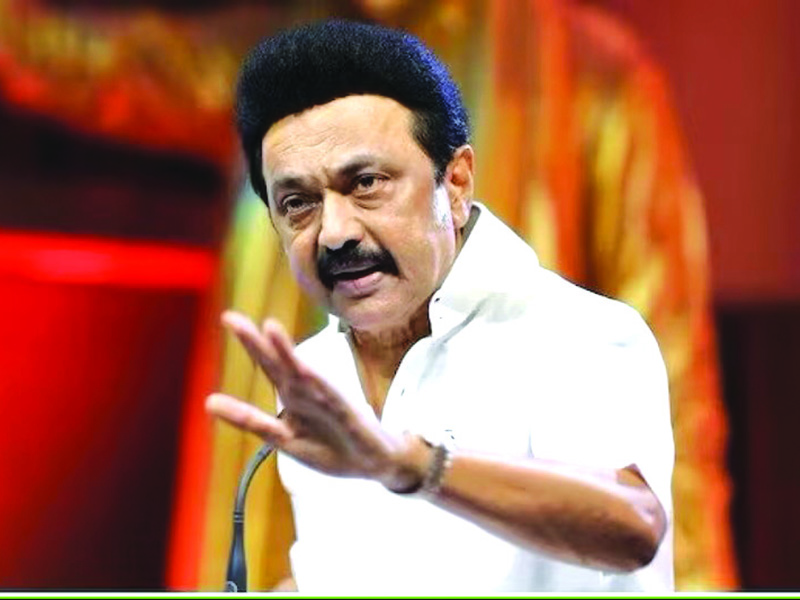Shivani Chaturvedi (Chennai)
Tamil Nadu chief minister MK Stalin
The DMK government of Tamil Nadu is determined to shift education from the concurrent list of the Constitution — which means that both the Central and state governments can enact legislation on education — to the state list.
During his Independence Day address in Chennai, chief minister M.K. Stalin said: “Moving education to the state list from the concurrent list of the Constitution is the way forward to scrap the National Eligibility cum Entrance Test (NEET)” — the national test which determines admission into all medical colleges (703) countrywide, including public and private medical colleges in Tamil Nadu (pop.68 million).
Chief minister Stalin’s remarks came on the back of heart-rending tragedies of a teen and his father, who took their own lives in August, which have shaken the state. The teenager, S. Jagadeeshwaran took his own life on August 12, after he failed to clear NEET. The student’s father, P. Selvasekar committed suicide a day later, unable to bear the loss of his son.
Following consistent reports that liberal marking of class XII school-leaving exam papers by the country’s 31 state exam boards were giving their students an advantage over students writing national CBSE, CISCE school-leaving exams and getting relatively easy admission into medical colleges and Central universities, over the past few years, the BJP government has been decreeing common national entrance exams on the highly successful IIT and IIM models. The objective is to provide a “level playing field” for all school leavers. Thus in 2016, the Central government mandated NEET — a common entrance exam — whose toppers in descending order get to choose medical colleges of their choice nationwide. Similarly in May this year, the Union education ministry introduced CUET (Common University Entrance Test) for determining admission into 47 Central government universities.
Centralisation of admission into India’s much-too-few institutions of near-global standards (IITs, IIMs, Central universities) has been a sore point with several state governments objecting to national common entrance tests on the ground that test papers are set to standards/syllabi prescribed by the national CBSE and CISCE exam boards which placed students graduating from state boards at a disadvantage, especially when writing NEET.
Tamil Nadu’s call to bring education under the state list is not new. On earlier occasions too, the state has demanded transfer of education to exclusively state subjects listed in Seventh Schedule under Article 246 of the Constitution as in the original Constitution document. Only during the height of Emergency declared by prime minister Indira Gandhi in 1975, when most opposition party members were in jail and Parliament was in disarray, was education transferred to concurrent list.
This controversy has elicited mixed response from academics in Tamil Nadu. ATB Bose, general secretary of the Association of Managements of Private Schools of Tamil Nadu, believes education should remain in the concurrent list in the interests of national integration and prevalence of acceptable standards of primary-secondary education countrywide. “As stipulated in NCF-SE 2023 in core subjects — languages, mathematics, science, vocational education — national standards need to be set by the Centre with some latitude in social sciences for regional content as provided in NCF-SE. This is necessary for labour mobility and overall equity,” says Bose.
On the other hand, Prince Gajendra Babu, general secretary of the State Platform for Common School System, Tamil Nadu believes “that education which was made a concurrent subject during the Emergency, should be brought back to states” — a long pending demand. “If brought under state control, the education policies can be tailored to suit the specific needs and culture of states, leading to more relevant curricula and pedagogies. Also, states are better positioned to preserving and promoting local languages, history, and culture. The role of the Centre should be restricted to providing guidelines, financial and technical support,” says Gajendra Babu.
In support of this contention, Gajendra Babu argues that until 1976 when education was made a concurrent subject, Tamil Nadu had built an impressive record of being India’s most educated state with numerous technical institutes, medical colleges and primary schools every 3 km and high schools at every 5 km. “States have vast experience in running schools and colleges, so why not restore the pre-1976 arrangement?” he queries.
While there is some merit in this argument, academics in Chennai warn that it’s important to bear in mind that India is a Union of States. “If there’s no commonality of curriculum and especially in the teaching of languages and core subjects, it could lead to balkanisation of India.
Mobility of labour and capital and India’s huge market — its greatest attraction — could be nullified. NCF-SE 2023 provides a broad curriculum framework within which states have considerable space to promote their own histories and culture. A national curriculum framework is a necessity for national unity going forward. The DMK and chief minister Stalin are playing dangerous electoral politics by interfering with children’s education,” says a Chennai-based social scientist, speaking on condition of anonymity.
As an ancient sage observed: “A politician thinks about the next election; only a statesman thinks about the next generation”.
Also read: Tamil Nadu: Father commits suicide a day after son takes own life for failing NEET
